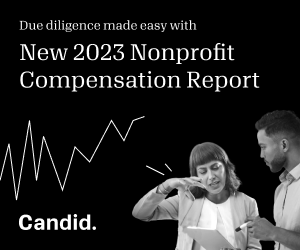Executive co-leadership: An emerging model for better economic equality

Tackling economic equality challenges as significant as America’s growing racial wealth gap will require our institutions to embrace new economic models that expand power, choice, and ownership over our economy—including organizational co-leadership.
Our organization, Common Future, which is dedicated to testing new approaches to build toward economic equity, did just this when we announced this month that we’re shifting to a co-leadership model with three co-CEOs.
As an all-female, multiracial leadership team, our varying identities reflect the many communities that our organization serves. We wanted to relieve the pressures that are placed on a single CEO, especially during a time when leaders—and women leaders and leaders of color in particular—are burned out and stepping back. This helps provide our organization with long-term continuity, should one leader opt to leave in the future.
Amid the “Great Resignation” driven by the COVID-19 pandemic, a growing wave of nonprofits like ours are diverging from the traditional executive director model to experiment with new ways of working and new ways of sharing power and centering BIPOC leaders, and are planning better for succession. Many of our partners share a co-leadership approach, including Kitchen Table Advisors, Mandela Partners, Project Equity, Sustainable Economies Law Center, Native Women Lead, and Justice Funders.
Our board considered several pathways for our organization's transition and ultimately decided on a co-leadership model due to the benefits of co-leadership and the strengths already present in our organization, including expertise in catalytic capital, sustainable revenue, operations, and other areas. While co-leadership is not a new model, its benefits have become increasingly important as the demands of a CEO evolve and as we design for a more equitable future where power is shared. Co-leaders have pointed to many benefits, including healthier workplace dialogue and resolution and lower rates of staff turnover.
Co-leadership is an exciting next step following our implementation of a four-day work week, compensation audits, and other future-of-work initiatives that aim to reduce burnout, build equity, and support working families. This model reflects our core values of shared leadership as it challenges traditional capitalist cultural norms around dominance and power.
Each of us is rising to the position from a prior internal role, having led different areas of our organization around the future of work, community-led investments, and funder relationships. Our complementary skill sets and different perspectives will help us make more intentional decisions that will drive our strategy forward while keeping us rooted in our mission. This will also enable us to take on specific areas of professional growth, furthering our complementarity in the co-CEO roles we share.
As we step into our new roles, our day-one challenge is the same one we now issue to our fellow funders and leaders: We must normalize the testing and building of community-led economic models, including co-leadership models. Our approach to economic equity must be two-fold: to redress harms with restorative and reparative investment, and to enable new economic models and solutions to emerge from communities most directly impacted by economic inequality.
While we aim to demonstrate and inspire the ways in which change is possible, change will require investment from all of us—including the resources of the government, the private sector, and, frankly, the wealthy. Our network spans over 200 community wealth-building organizations and we’ve shifted $280 million into communities of color. And with our new structure and expanded leadership, we’re ready to build on this work.
Community-led solutions shouldn’t be a specialty or afterthought. They can be an anchor point that helps groups to stabilize and grow. We’re eager to show how better models can be implemented, and we welcome others to join us as we continue testing and building ideas, including our own leadership structures.
Jessica Feingold, Sandhya Nakhasi, and Jennifer Njuguna are co-CEOs of Oakland-based Common Future.








Fostering solidarity and success in nonprofit leadership